#hanzi study
Explore tagged Tumblr posts
Text
Beginner Resources: Studying Hanzi
Are you starting to learn Chinese? Are you trying to figure out how to approach studying hanzi?
First, I would suggest you read some short article that explains radicals in hanzi. Those are the components that 'spell' the hanzi character, there's not very many, and they can often help you guess the meaning or pronunciation of a hanzi you run into. Here is a list of Chinese radicals on Berlitz.com so you can get some familiarity with what they look like, their pronunciation, meaning, and some example hanzi that have those radicals. This Chinese Character Radicals wikipedia article explains how radicals can sometimes contribute a meaning or sound to the hanzi. I suggest reading through both of these articles fully, and saving them to reference later. You do not need to memorize, or spend more than a couple hours reading these. Just having a basic familiarity with what radicals are, and what they contribute to a hanzi, will be helpful as you learn hanzi.
For Chinese beginners, this is still absolutely my favorite study resource for learning hanzi. The book teaches 800 common hanzi, from HSK 1-3, and it uses mnemonic stories it provides you (so you don't have to come up with stories on your own - unlike Heisig) to teach meanings and pronunciation and tone. After studying this book, it's achievable to keep using the same kind of mnemonic story strategy used in this book to keep learning hanzi on your own. That's what I did. This book got me from 0 hanzi knowledge, to enough to read graded readers (I read Mandarin Companion and graded readers sold on Pleco app), and then from there I'd picked up enough additional hanzi to start reading the Newcomer/Beginner stories suggested on Heavenly Path Notion Site's recommendations. (I jumped into reading harder stuff way faster than I perhaps should have, and eventually went back and read some of the Newcomer/Beginner stuff Heavenly Path recommends such as TuTu DaWang 禿禿大王).
Learning Chinese Characters: (HSK Levels 1-3) A Revolutionary New Way to Learn the 800 Most Basic Chinese Characters; Includes All Characters for the AP & HSK 1-3 Exams
There is also an anki deck, with mnemonic stories provided, to keep studying hanzi if that method works well for you and you need a little more aid for a while before moving onto learning hanzi entirely on your own. This is the anki deck I used for around ~500 hanzi when I was trying to speed up my hanzi recognition, since I jumped into reading BL webnovels pretty fast (faster than I probably should have lol): Mnemonics - 3018 Simplified Chinese Hanzi
There is also a traditional version of that anki deck: Mnemonics - 3035 Traditional Chinese Hanzi
#rant#chinese#chinese resources#chinese reference#hanzi#hanzi study#chinese characters#radicals#study resources#hanzi resources#langblr#these are what I used to study hanzi#they all worked very well. I never finished the anki deck because as I read more I picked up a lot more hanzi by just reading#That Tuttle 800 hanzi book is absolutely what made hanzi something I could initially remember finally.#and indirectly it helped tremendously with japanese kanji as well... i tried Heisig for kanji and hanzi and it never worked for me
97 notes
·
View notes
Note
suggestions and advice on how to remember and memorize characters? it's the part I'm finding the most difficult
i struggle w this too rn bc of the pace my professor has been going at. if you dont have a practice workbook i def recommend those bc they show the stroke order and just give space for you to write repetitively. otherwise just try and write sentences using the characters/words you know or generally practice writing/reading as much as possible.
i like skritter a lot for practicing characters or learning new vocabulary related to things im actually interested in and would talk about in real life rather than a lot of the stuff ill learn in class.
because of the lack of alphabet a lot of people (me included) tend to rely heavily on pinyin but since ive started learning zhuyin i’ve definitely felt it helps. not having romanization means i have to actually try and cant just fall back and give up like i would if something was shown only in characters + pinyin.
i specifically like using my ipad or an external monitor when im studying characters so i can blow up the characters and look at them like an image rather than a letter (im learning traditional these little things have so many strokes i like to make sure i can see/recognize all of them) then also i feel like it stays better as a visual in my brain.
im still taking elementary level mandarin so realistically i dont know all that much, only what ive been trying and what works for me if anyone else has tips pls feel free to reply
#studyblr#study blog#langblr#langblog#language learning#languageblr#chinese langblr#mandarin langblr#studyblr community#chinese characters#hanzi
32 notes
·
View notes
Text


你好! Last week I couldn't upload anything, but ironically, it was the week I studied the most. I've learned so much, and today I took the last exam of my Chinese program's first level. I'm thrilled to start the next one!
3 notes
·
View notes
Text


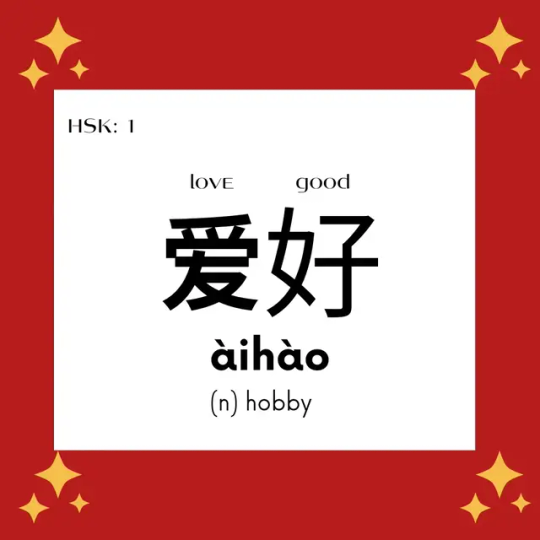
My first post on this studyblr! Today's Hanzi of the day is love, could it be more beautiful!
I hope you enjoy it! Support my work here: Buy Love Asian Languages a Coffee. ko-fi.com/loveasianlanguages - Ko-fi ❤️ Where creators get support from fans through donations, memberships, shop sales and more! The original 'Buy Me a Coffee' Page. and follow me on IG!
#studyblr#study blog#study motivation#studying#chinese#hanzi#love#love quotes#hobby#hobby artist#language#learnchinese#learning#studying challenge#flashcards#asia#china#chinese studyblr
6 notes
·
View notes
Text
thinking about maybe starting studying korean since it's got a ton of resources online that would make it easier for me to pick up.
#i know some of my mutuals study korean—what are your guys' thoughts?#my main draw is that i already can read hanzi/hanzha and the writing system is 100% regular#also according to my mother it's really similar to turkish in a lot of ways?#not sure how true that is but hey if it is then i've already got a headstart because turkish is one of my mother tongues#indigo ink
11 notes
·
View notes
Text
今天我学了这个:
汉字:耳;闻;联;系; 女 (225/3050)
词汇:关系 ; 联系;女人;美女;女儿
#chinese language#mandarin chinese#languageblr#langblr#hanzi#中文#studying#learning chinese#mandarin#汉字
1 note
·
View note
Text
English and Japanese, primarily. And a smattering of Spanish, German, and Mandarin.
Tagging @squachtower @in-echoes-forever @phemelovesme
I'm curious, what languages do my mutuals know?
I speak both English and German, and I know some very basic phrases of Finnish, Spanish, and French.
Tag your mutuals!!
@serene-sky-kid @halcyon-xxy @plutonium-sky @ari-skycotl @arsolitaforever @beigetiger @ejsuperstar
If I forgot you, I'm sorry, and don't be afraid to join in regardless <3
#thanks for the tag!#also girl that's awesome#not boring???????#i took German in high school but i don't remember much#my dad speaks Spanish so I've picked up a little from him#i started Mandarin last year but i haven't gotten very far#recognizing kanji/hanzi is very useful#but i haven't had much luck with pinyin...#i don't have much time to study tho#so i focus mostly on Japanese vocab and kanji#they'll give me a boost later on (i hope)
808 notes
·
View notes
Note
POLYGLOT SEVIKA IS SO REAL TO ME
do u ever think she'll say idioms from another language that doesnt really work in english? like imagine overhearing her say "he's fart" when in her head she knows she's calling someone really drunk but the saying really only works in spanish, y'know?
this actually made me laugh out loud lmfaooo
men and minors dni
sevika grew up in a multi-lingual house. her mother spoke spanish, her father spoke hindi, and to one another they spoke in english.
by the time she was entering school, she was fluent in three languages. her little brain was so flexible and she loved learning so much that she took to new languages like a fish takes to water.
she excelled in her mandarin classes; while most students were struggling with the pinyin system, she was flying through the textbook and studying hanzi in her free time.
the little boy next door to her growing up spoke arabic with his family, and she picked up on the language with ease after years of playdates and shared dinners. that combined with her hindi meant that when an urdu speaking student joined her class in the third grade, she was able to act as a translator for them.
in high school she gets a job at a little mom and pop shop. the old couple who own it speak russian to each other, constantly yelling across the tiny store at one another. three months into the job, sevika finds herself cursing people out with slavic curses she didn't even know she knew.
so sevika grew up speaking a lot of languages. and she learned most of them through practical, every day use; not through textbooks and school. she's got a lot of sayings buried deep in her mind that she doesn't even remember learning, and sometimes, they don't always come out in the right language.
"aunt sev, did'ya know that i can do ten cartwheels in a row?" jinx asks as she hauls herself into sevika's lap.
sevika lets out a long sigh as she pushes her reading glasses into her hair and closes her book, turning her attention to her god-daughter. "wow." she mumbles tiredly. you chuckle from your chair.
"uh-huh! and i can do six back flips."
sevika snorts. "sure you can, kid."
"and i can dunk a basketball!"
sevika laughs. "okay, now you're hanging noodles on my ear." she says.
you snort from your spot. "she's doing what?" you ask.
sevika giggles. "shit, that's supposed to be in russian. veshat lapshu na ushi. y'know, like, uh... you're trying to trick me."
you giggle. "hanging noodles on your ear, huh?"
her little slip ups happen more frequently when she's tired.
"how was your day, sevi-bear?" you ask as you crawl into bed beside your girlfriend.
"ah. onions and honey, y'know." she mumbles.
you freeze, racking your brain to figure out what the hell she's talking about. you can't manage. "what?" you ask.
sevika blinks at you. "one day honey, one day onions, y'know?"
"so... you were having weird cravings?"
sevika laughs. "no, no, shit, i used the wrong language again."
you giggle. "what's it supposed to sound like?" you ask. you adore the sound of sevika's voice, regardless of if you can understand her or not.
"yom asal, wa yom basal. 's arabic." she whispers. you smile.
"your voice is like honey." you say. she snorts and leans forward to kiss you.
her mix-ups also happen when she's flustered.
"d-do you like it?" you whisper shyly.
sevika blinks at you, her eyes wide as she takes in your appearance. you've decided to surprise her tonight, buying a special set of sexy undies just for her.
"holy shit. you're beautiful." she whispers. you giggle.
"i read online that this color clashes with my skintone--"
"what do monkeys know of the taste of ginger, my love? you're gorgeous."
you burst into giggles. "sev-- what?!" you cackle.
she giggles and shakes her head. "bandar kya jaane adrak da swaad, fuck what those internet losers say, baby."
you're cut off from asking more questions by sevika's lips crushed against yours.
your favorite of all her slip ups happened when she was drunk.
you woke up to a thump in your home.
"sev?" you call. you can hear her giggling from the living room. you crawl out of bed and into the living room, laughing when you find your girl toppled over and struggling with her boots. "how was poker night?" you laugh as you bend over to help untie her shoes for her. sevika grins at you, wiggling to try to pull you onto the floor with her.
"baby. 'm so fart right now."
you blink, then sniff the air. "i don't smell anything, baby. you need me to help you to the toilet?" you ask.
sevika laughs. "no, no, baby. i'm fart! farted! whatever."
you shake your head in confusion, and then it hits you. "sevika, estas pedo!?" you ask with a laugh.
sevika grins and nods up at you. "yes! 'm fuckin' wasted! y'r so beautiful, i love y' s'much."
you giggle and haul your wife to her feet, gently guiding her toward your room. "i'll set a barf bucket and some painkillers out for you, okay?"
"mmm. wǒ ài nǐ." she mumbles into her pillow.
you giggle and kiss her forehead. "i love you too, you fart."
kofi
taglist!
@fyeahnix @lavendersgirl @half-of-a-gay @thesevi0lentdelights @sexysapphicshopowner
@kissyslut @chuucanchuucan @badbye666 @femme-historian @lia-winther
@lavenderbabu @emiliabby @sevikasbeloved @hellorai @my-taintedheart
@glass-apothecary @macaroni676 @artinvain @k3n-dyll @sevsdollette
@ellieslob @xayn-xd @keikuahh @maneskinwh0re @raphaellearp
@iamastar @sevikitty @mascdom @nhaaauyen @annesunshiner
@mirconreadzztuff22 @veoomvroom @lushh-s3vik4s @katyawooga @lesbodietcoke
@strawberrykidneystone @vkumi @fict1onallyobsessed @dvrkhcld @sweetybuzz25
@sluttysierraaa @snake-in-a-flower-crown @ruiwonderz @littlemisszaunite @biblicalcrybaby
@blackgaladriel @nightlyconfusion @dancingqu33n17 @losernb @p1nkearth
taglist!!
@sevikas-baby @ghostscandys @sevikasllver @runawaybaby3 @lesbones
@chezze-its @lez-zuha @vikashoneybee @shanesevikasfuckdoll @imheadintothemountains
@nanajustnana-a @helaenabugmom @spookymomfriendtm @leeidk87
201 notes
·
View notes
Text

These are the apps and links I currently have on my phone to study Chinese:
SuperChinese: my main study resource. There are currently 7 levels, level 7 (still incomplete, they are still slowly adding lessons to it) being HSK 5 stuff. Each lesson has vocabulary, grammar and a short dialogue where those are used in context (I love context). It has a few free lessons in the lower levels but after that you have to buy a subscription. There are many sales though. When I was a beginner I used HelloChinese instead, which has more free content, and switched to SuperChinese when I finished all the free content there. It also has social network features and chat rooms I don't use.
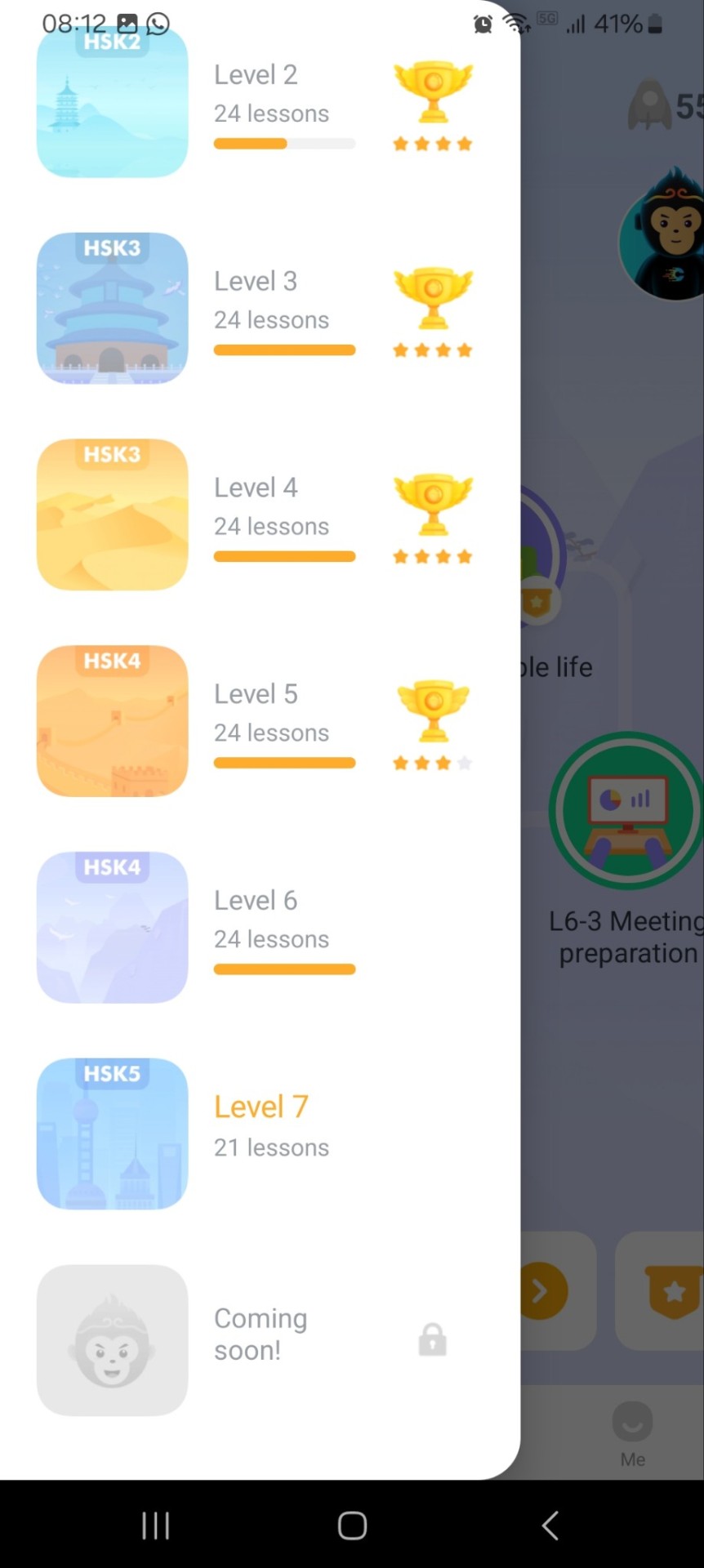
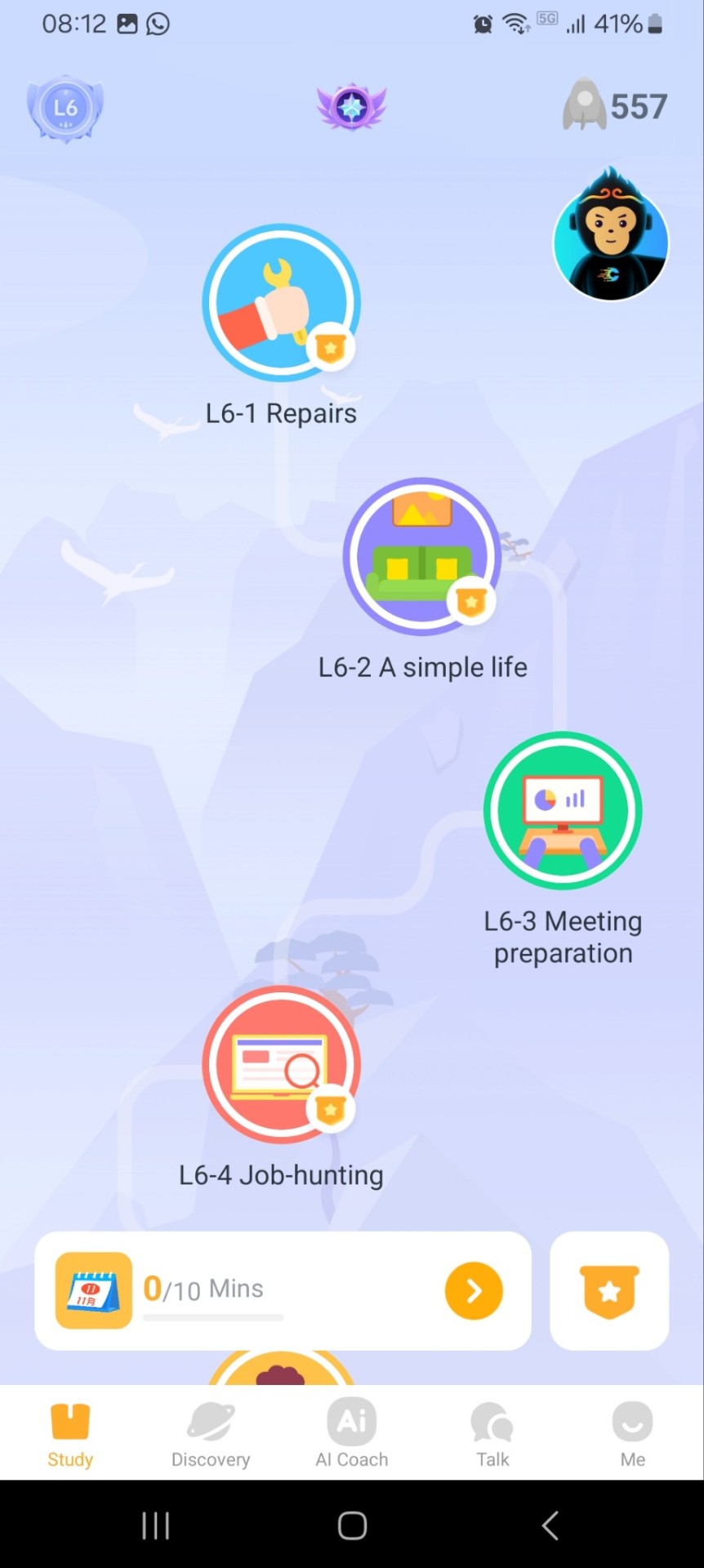
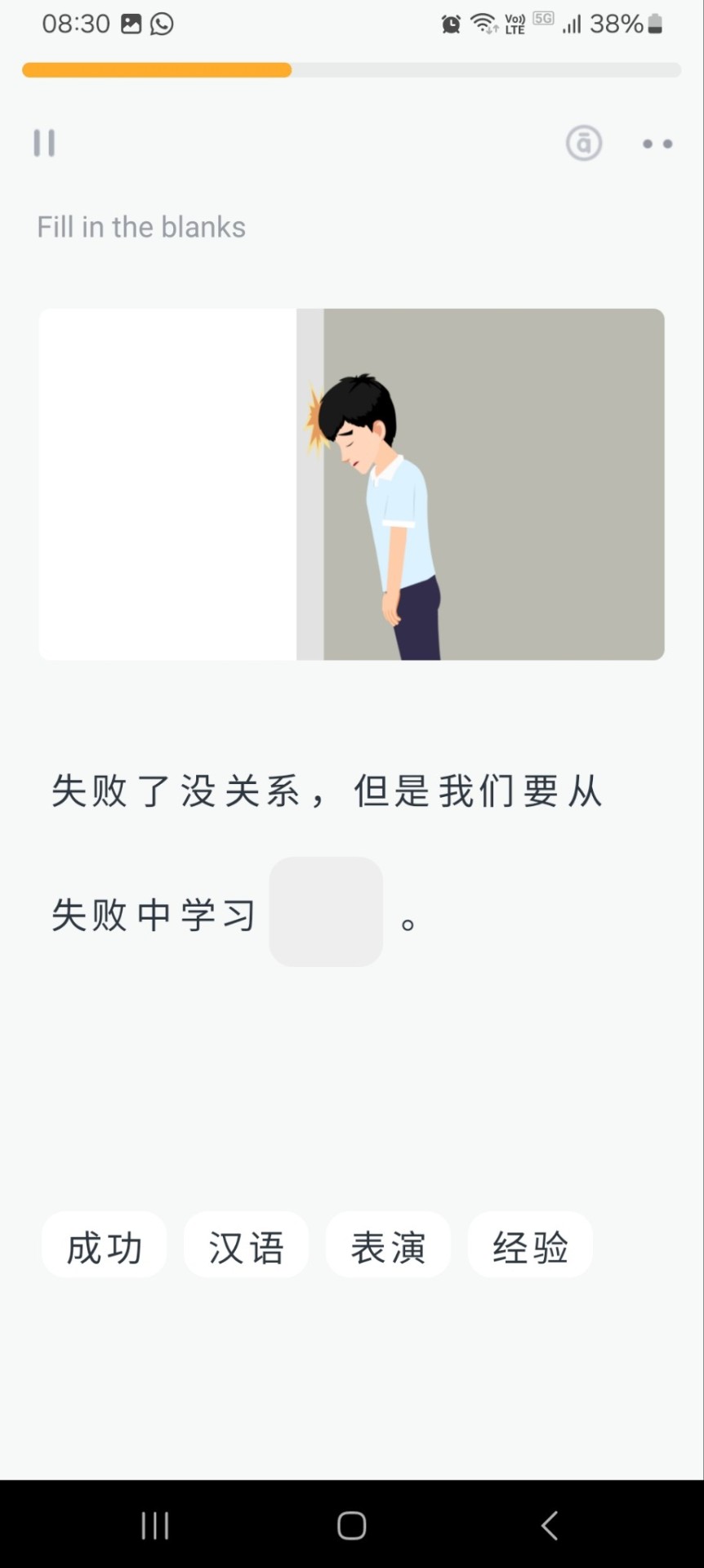
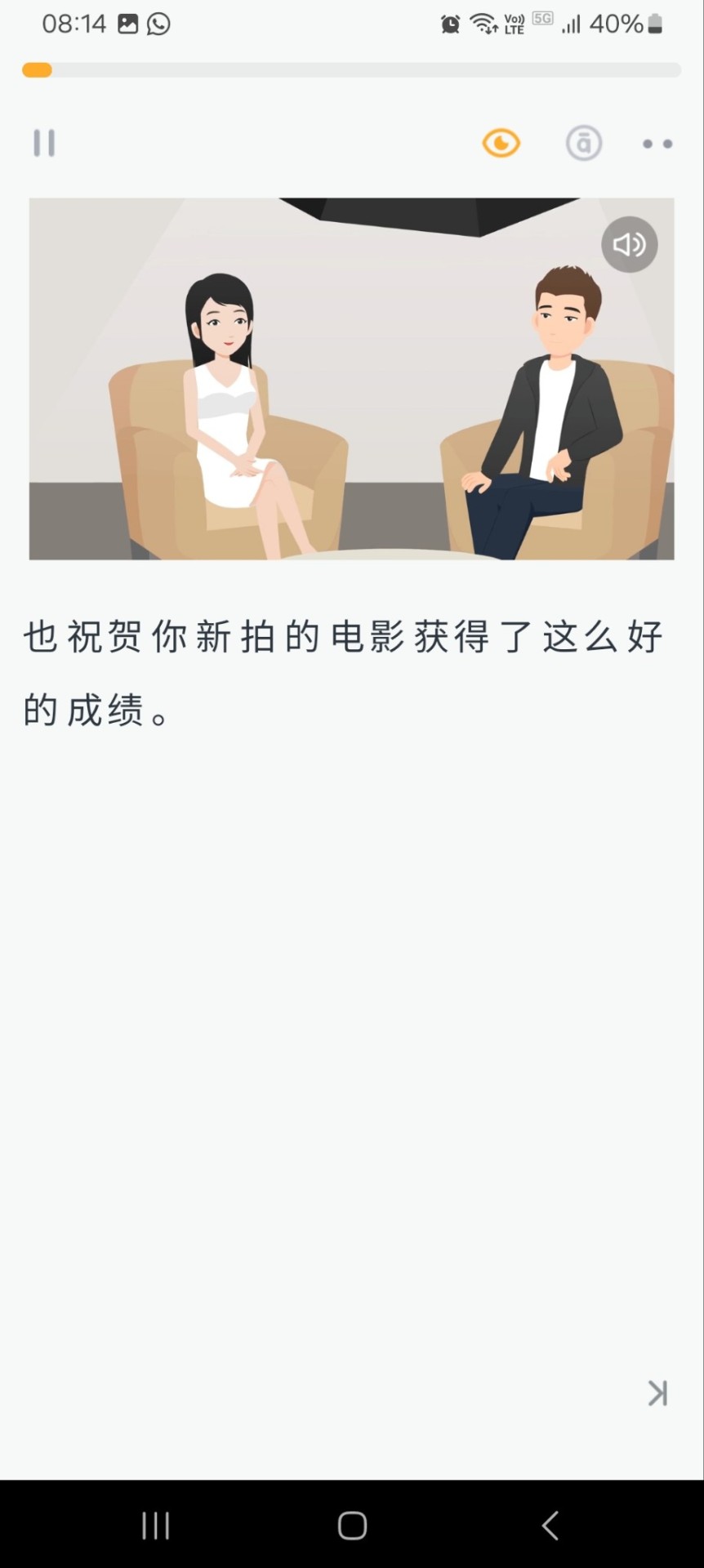
TofuLearn is like a flashcard app with many pre-made decks (you can also create your own on their website and import decks from Anki) and the option to practice writing hanzi. Anki didn't work for me, but I find Tofu very helpful. Practicing writing helps me with character recognition, and it also helps me remember the tones thanks to the audio in the pre-made HSK decks.
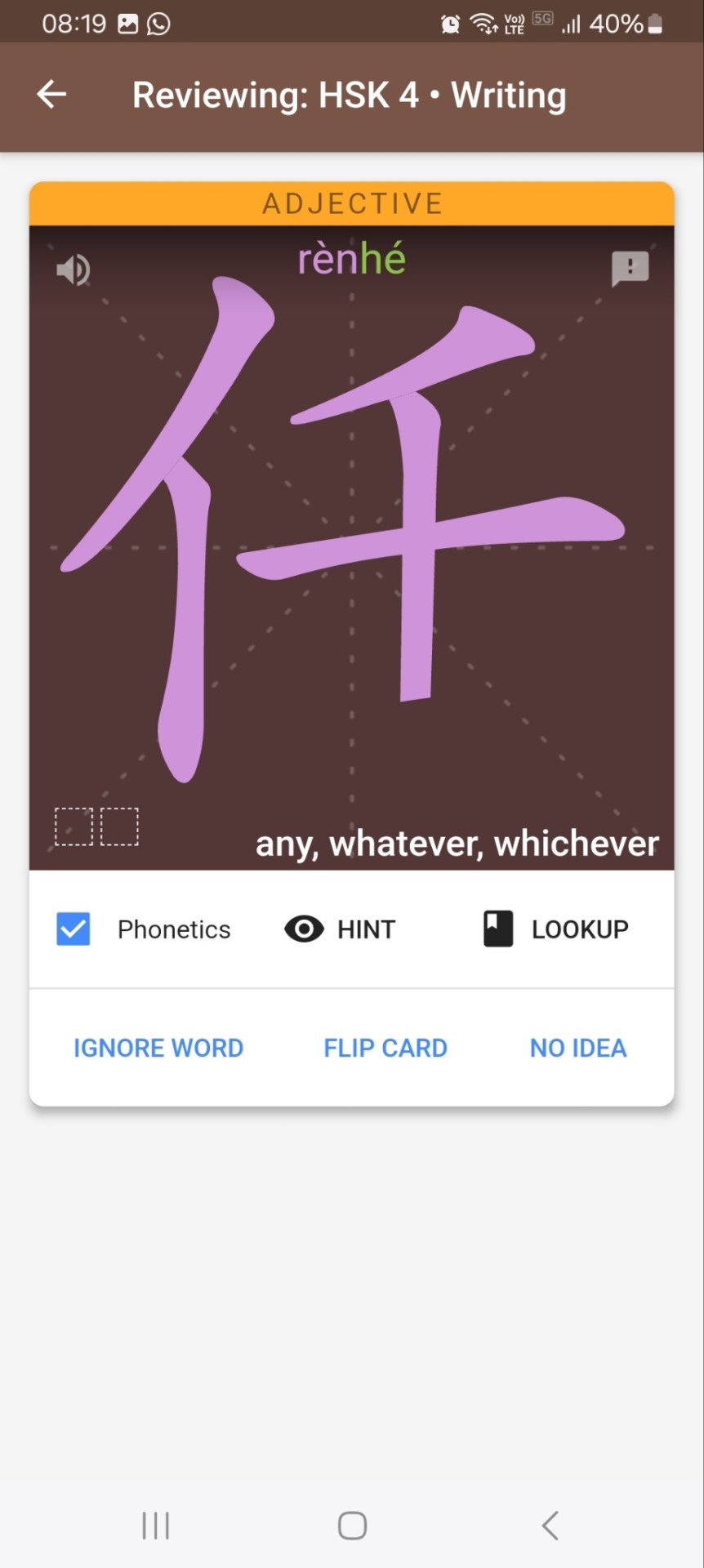
Dot is a reading app with new texts being added every day. It used to be completely free, which actually seemed too good to be true, and then they put practically everything behind a paywall and very strict limits for free users. After a couple of months they made it a little less restricted though - we still can't choose the articles but we can read as many as we want as long as we do the vocabulary exercises after each article (plus, during the Spring Festival, they made all articles available for free for 3 days and we could save the ones we were interested in to read later). It follows the new, not-yet-implemented (and harder) HSK levels, so you should start one or two levels below yours and if the texts are too easy move up.
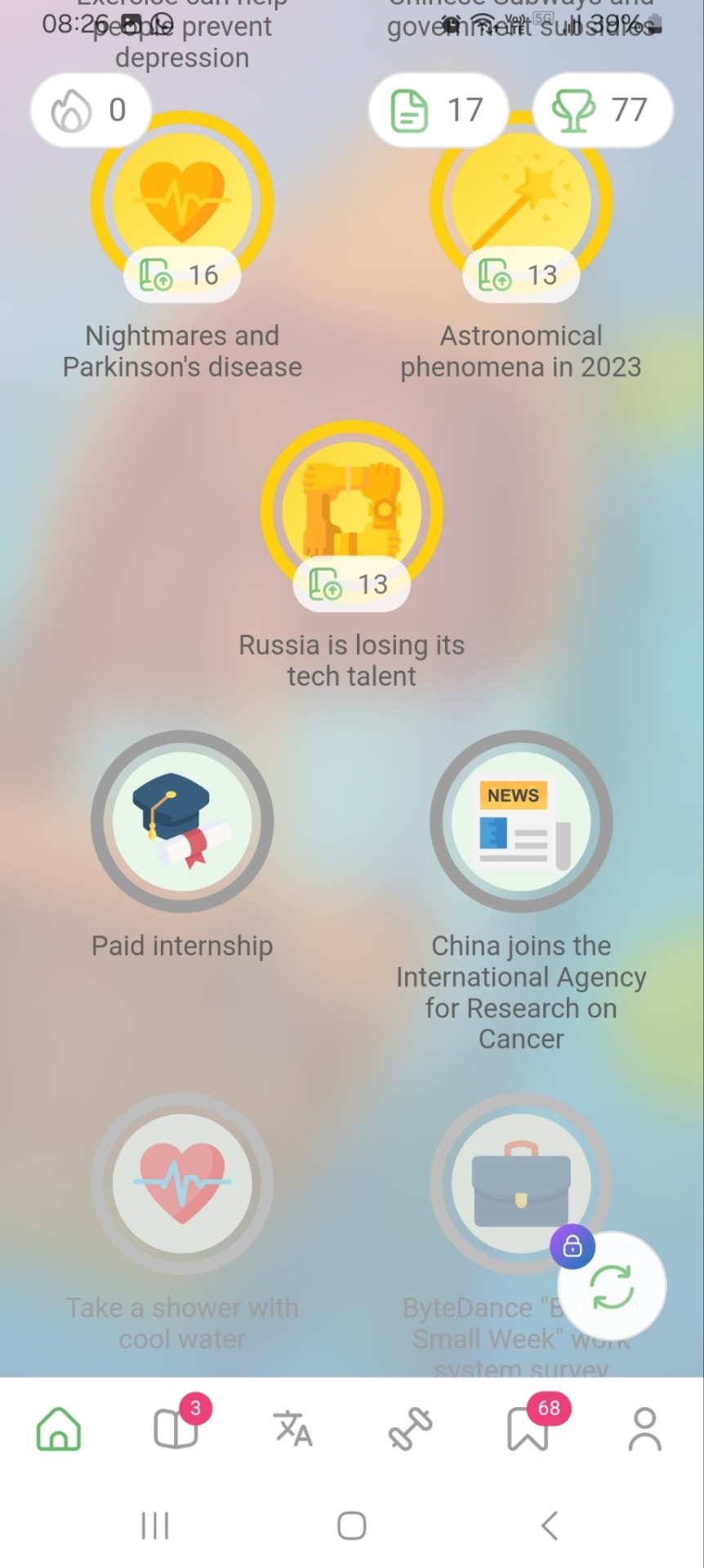
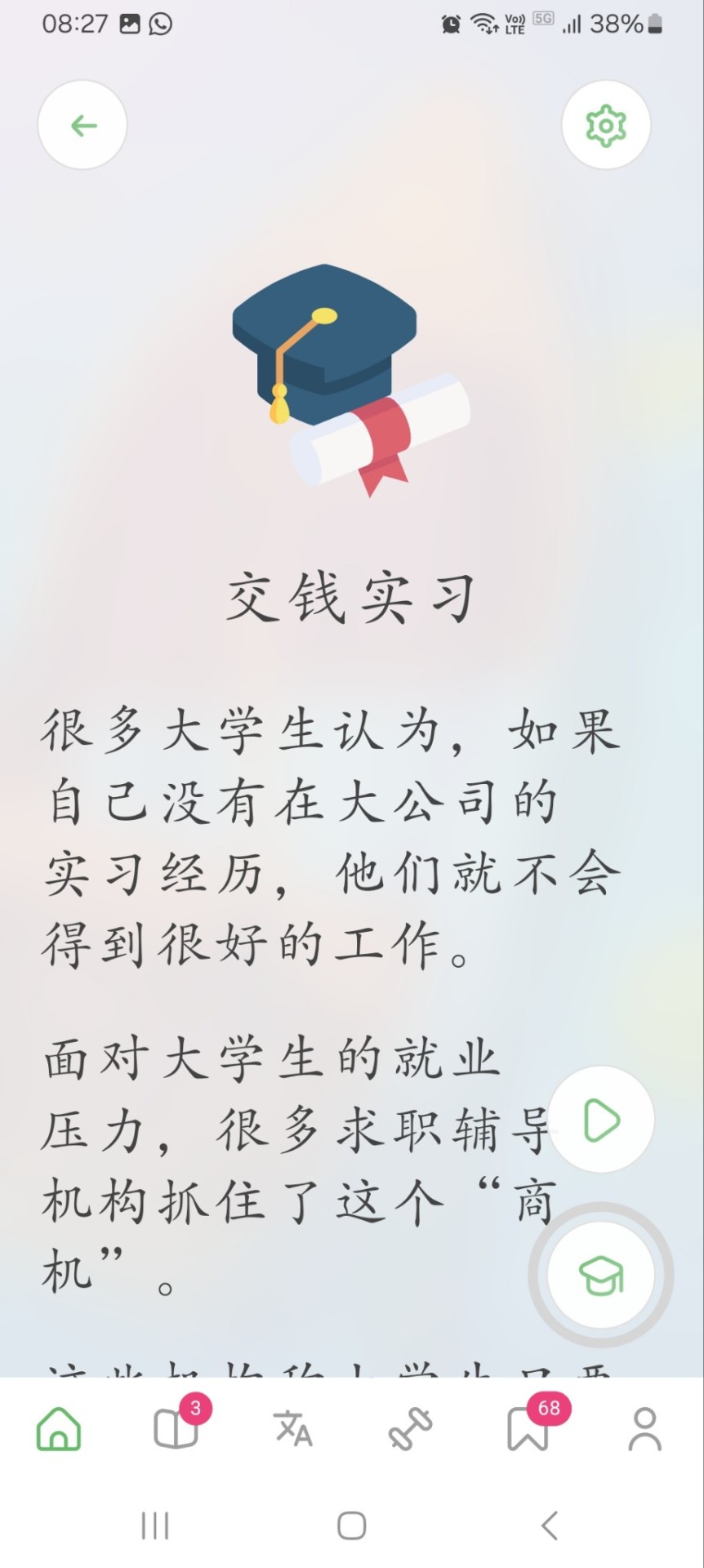
Google Translator: not the best but helpful when I need to translate whole sentences, plus I can point my camera or open an image and it translates writing.
Pleco: best Chinese to English dictionary.
Stroke Order: not an app but a website, does what it says in the tin: shows stroke order for a specific character.
YouGlish: also a website, you can put a word or phrase and it shows videos where people say that word/phrase. Very cool.
Todaii is a graded news app that has only two levels: easy and hard. I'm around level HSK4 and the "easy" level is quite hard though (but I admit reading is my nemesis).
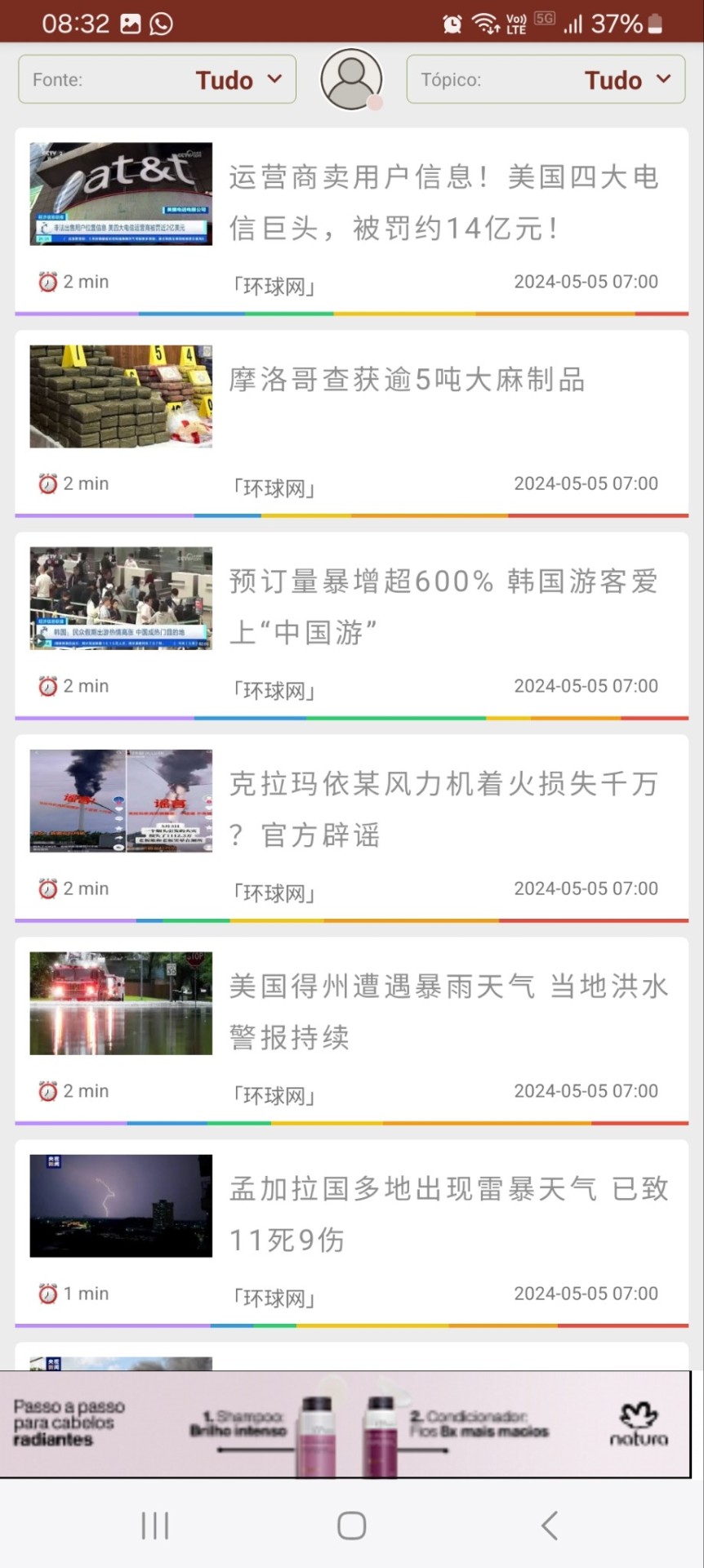
I also use YouTube and Spotify a lot.
#personal#resources#langblr#language learning#learning chinese#chinese langblr#chinese language#mandarin#中文
519 notes
·
View notes
Text
how i'm studying mandarin (in 2024)
as a low-maintenance language learner working a 9-6 office job, i've been muddling around how to improve my mandarin in my free time and keep it fun! And I've found what works for me (thanks to a lot of lurking on here - appreciate all you mandarin langblrs <3), so wanted to share :)
Evening lessons (or italki) - Self studying is great but I do need a kick up the ass sometimes, so these really help. Plus my teacher is great at giving tips here and there which I probably wouldn't pick up on on my own.
ChinesePod - Their podcasts are really well made and accessible, I can't recommend them enough!
HelloChinese - This is my 'I'm bored waiting for my train/bus but I still want to learn Chinese' option that isn't Duolingo. It's not perfect but it has fairly good grammar explanations and native listening segments. You do have to pay a subscription if you're over HSK1 level FYI.
I am an anki hater first and foremost, so here's the vocab learning / dictionary tools I use instead:
TofuLearn - It's straightforward, uses spaced repetition learning AND teaches you stroke order - so ticks all my boxes. Picked it up due to @marilearnsmandarin's posts about it!
Pleco - Obviously, everyone has it downloaded for a reason.
Yabla Chinese Dictionary - Not seen this one talked about so much, but would recommend! It sometimes has video examples of the hanzi in use, which I find helpful.
A big goal for me this year is to consume mandarin content more regularly! It's all well and good watching Peppa Pig, but I need something that I actively want to engage with:
Bilibili Comics - Currently reading 肉店楼上的工作室 and able to understand a fair chunk, so would recommend as a "easier" option.
Mandopop - Not sure how much I'm picking up from listening, especially at my level, but it's fun to jam out to some good tunes. Faves include TIA RAY, Song Qian, Lexie Liu, No Party for Cao Dong & Shi Shi.
Dramas/Movies - Modern chinese dramas are a lot more hit-or-miss for me, especially compared to historical/fantasy. Recent faves include Accidentally in Love & Stay with Me (on Netflix/Viki). Currently watching Reset :) Any other recs, please send my way!
YouTube - I have a separate YT account just to follow Taiwanese/Chinese creators - it takes a bit of searching but you can find some great youtubers who talk about whatever hobby you're into (whether that's cute golden retriever vlogs, travel vlogs or reading vlogs!)
546 notes
·
View notes
Text
thoughts about the Cardassian writing system
I've thinking about the Cardassian script as shown on screen and in beta canon and such and like. Is it just me or would it be very difficult to write by hand?? Like.

I traced some of this image for a recent drawing I did and like. The varying line thicknesses?? The little rectangular holes?? It's not at all intuitive to write by hand. Even if you imagine, like, a different writing implement—I suppose a chisel-tip pen would work better—it still seems like it wasn't meant to be handwritten. Which has a few possible explanations.
Like, maybe it's just a fancy font for computers, and handwritten text looks a little different. Times New Roman isn't very easily written by hand either, right? Maybe the line thickness differences are just decorative, and it's totally possible to convey the same orthographic information with the two line thicknesses of a chisel-tip pen, or with no variation in line thickness at all.
A more interesting explanation, though, and the one I thought of first, is that this writing system was never designed to be handwritten. This is a writing system developed in Cardassia's digital age. Maybe the original Cardassian script didn’t digitize well, so they invented a new one specifically for digital use? Like, when they invented coding, they realized that their writing system didn’t work very well for that purpose. I know next to nothing about coding, but I cannot imagine doing it using Chinese characters. So maybe they came up with a new writing system that worked well for that purpose, and when computer use became widespread, they stuck with it.
Or maybe the script was invented for political reasons! Maybe Cardassia was already fairly technologically advanced when the Cardassian Union was formed, and, to reinforce a cohesive national identity, they developed a new standardized national writing system. Like, y'know, the First Emperor of Qin standardizing hanzi when he unified China, or that Korean king inventing hangul. Except that at this point in Cardassian history, all official records were digital and typing was a lot more common than handwriting, so the new script was designed to be typed and not written. Of course, this reform would be slower to reach the more rural parts of Cardassia, and even in a technologically advanced society, there are people who don't have access to that technology. But I imagine the government would be big on infrastructure and education, and would make sure all good Cardassian citizens become literate. And old regional scripts would stop being taught in schools and be phased out of digital use and all the kids would grow up learning the digital script.
Which is good for the totalitarian government! Imagine you can only write digitally. On computers. That the government can monitor. If you, like, write a physical letter and send it to someone, then it's possible for the contents to stay totally private. But if you send an email, it can be very easily intercepted. Especially if the government is controlling which computers can be manufactured and sold, and what software is in widespread use, etc.
AND. Historical documents are now only readable for scholars. Remember that Korean king that invented hangul? Before him, Korea used to use Chinese characters too. And don't get me wrong, hangul is a genius writing system! It fits the Korean language so much better than Chinese characters did! It increased literacy at incredible rates! But by switching writing systems, they broke that historical link. The average literate Chinese person can read texts that are thousands of years old. The average literate Korean person can't. They'd have to specifically study that field, learn a whole new writing system. So with the new generation of Cardassian youths unable to read historical texts, it's much easier for the government to revise history. The primary source documents are in a script that most people can't read. You just trust the translation they teach you in school. In ASIT it's literally a crucial plot point that the Cardassian government revised history! Wouldn't it make it soooo much easier for them if only very few people can actually read the historical accounts of what happened.
I guess I am thinking of this like Chinese characters. Like, all the different Chinese "dialects" being written with hanzi, even though otherwise they could barely be considered the same language. And even non-Sinitic languages that historically adopted hanzi, like Japanese and Korean and Vietnamese. Which worked because hanzi is a logography—it encodes meaning, not sound, so the same word in different languages can be written the same. It didn’t work well! Nowadays, Japanese has made significant modifications and Korean has invented a new writing system entirely and Vietnamese has adapted a different foreign writing system, because while hanzi could write their languages, it didn’t do a very good job at it. But the Cardassian government probably cares more about assimilation and national unity than making things easier for speakers of minority languages. So, Cardassia used to have different cultures with different languages, like the Hebitians, and maybe instead of the Union forcing everyone to start speaking the same language, they just made everyone use the same writing system. Though that does seem less likely than them enforcing a standard language like the Federation does. Maybe they enforce a standard language, and invent the new writing system to increase literacy for people who are newly learning it.
And I can imagine it being a kind of purely digital language for some people? Like if you’re living on a colonized planet lightyears away from Cardassia Prime and you never have to speak Cardassian, but your computer’s interface is in Cardassian and if you go online then everyone there uses Cardassian. Like people irl who participate in the anglophone internet but don’t really use English in person because they don’t live in an anglophone country. Except if English were a logographic writing system that you could use to write your own language. And you can’t handwrite it, if for whatever reason you wanted to. Almost a similar idea to a liturgical language? Like, it’s only used in specific contexts and not really in daily life. In daily life you’d still speak your own language, and maybe even handwrite it when needed. I think old writing systems would survive even closer to the imperial core (does it make sense to call it that?), though the government would discourage it. I imagine there’d be a revival movement after the Fire, not only because of the cultural shift away from the old totalitarian Cardassia, but because people realize the importance of having a written communication system that doesn’t rely on everyone having a padd and electricity and wifi.
#if I read over this again I will inevitably want to change and add things so I'm refraining from doing that. enjoy whatever this is#forgive my very crude recounting of chinese and korean history! I am neither a historian nor a linguist#but I will NOT apologize for talking abt china so much. that's my culture and I'm weird abt it bc of my family history#and it's my GOD GIVEN RIGHT to project what little I know abt it onto all my worldbuilding#also I've never actually read abt any of the various cardassian conlangs but I'm curious if this contradicts or coincides with any of them#I still want to make my own someday. starting college as a linguistics major (in 2 weeks!!) so presumably I will learn how to do that#narcissus's echoes#ds9#asit#star trek#cardassians#cardassian meta#a stitch in time#hebitians#lingposting
762 notes
·
View notes
Text
Chinese Listening Experiment - Some Thoughts on how to apply Dreaming Spanish method to other languages when learning to read
If you are not familiar with Dreaming Spanish, the method is basically Comprehensible Input Method or ALG, and a decent portion of the people who learn using Dreaming Spanish just follow that method (purist approach) or use other study methods in addition to the Dreaming Spanish Method (non-purist approach). I find the subreddit for r/dreamingspanish quite friendly because it is welcoming to people who've taken traditional classes before/currently, who've studied with flashcards/anki, and anyone else who does things outside of Comprehensible Input for study. The subreddit r/dreaminglanguages is also friendly of people studying with mainly Comprehensible Input that have also done other methods of study before/may be doing other methods at the same time.
Comprehensible Input Method is basically watching videos (or taking in person classes or livestream classes) of a teacher speaking your target language only, and using visuals like images and gestures to give you enough context to understand what the main idea they're conveying is. So you learn the target language entirely IN the target language. You go through lessons for 'beginners,' 'intermediate' and 'advanced' learners (the lessons tend to be labelled or named for the level of learner they make the lesson 'comprehensible' for). Eventually you engage with other content in the target language - other stuff made for learners that's entirely in the target language (like learning podcasts for 'beginner' 'intermediate' 'advanced' and graded readers).
Then eventually you engage with content in the target language made for native speakers - whatever you can comprehend the main idea of (vlogs, shows, comics, stuff with visuals tends to be easiest). Anything you already know the context for, such as shows and books you've read before in a language you know, may be easier to comprehend sooner since you already know the main idea of the material. Over time, the amount of content made for native speakers that you understand increases, and you expand the content you engage with (like novels, shows that talk about abstract subjects, podcasts, audiobooks). Once you are using content in the target language made for native speakers that you comprehend the main idea of, you are basically 'immersing' and can look up immersion study tips. To do a pure comprehensible input method like Dreaming Spanish advises, you would look up no word translations, you would look up words in a target language dictionary if you wanted to look something up.
Many people do Comprehensible Input alongside other study methods, such as looking up word translations and making flashcards because they don't actually care if some of their study activities involve non-target language material. (I don't use purely comprehensible input method to study, I do other stuff, I look up translations often, and I sure read a bunch of grammar guides as a beginner). Like I mentioned, the subreddits r/dreamingspanish and r/dreaminglanguages are fairly friendly to people doing a 'non purist' approach, such as people who continue to use translation tools and flashcards, or people who took traditional classes in the past/currently (which tend to explain grammar and vocabulary meanings not in the target language but in the language the learner is assumed to already know).
For the purpose of this post, I am going to be reflecting on how to study in the Comprehensible Input Method way, like Dreaming Spanish suggests to study (more or less), and how to apply that to various languages.
For languages using the latin alphabet, if you already know the latin alphabet? Or for any language where you already know the symbols of the writing system. Follow the study suggestions as Dreaming Spanish lays it out, it should work fine. So whether you study Spanish, or French, or Portuguese, find beginner-intermediate-advanced comprehensible input lessons and complete them, use children's shows with a lot of visual context as additional comprehensible input, use podcasts made for learners (who are at your level of understanding - so for beginners etc) entirely in the target language (or as close to only in TL as you can find) as additional comprehensible input. Eventually use TV shows with a lot of visual context (like action shows or slice of life) or TV shows you've seen before (and already know the context) for additional comprehensible input. Optional: I would suggest you also find a Comprehensible Input Lesson video that goes over the alphabet/writing system and the name and pronunciation of each letter, ideally find a lesson video IN the target language. If you cannot find a lesson video on the writing system in the target language, finding a video or website that shows a chart of the letters and pronounces them will work. If you have to read some non-target language text, I guess that'll technically not be pure comprehensible input. The main point is to see the target language writing system and hear the pronunciation. This part is not recommended/necessary in Dreaming Spanish, but since children learn the alphabet when they start school or beforehand, it might be useful to also learn it to make your efforts learning to read easier.
Dreaming Spanish suggests you can start learning to read around 600-1000 hours of comprehensible input - and I suggest you start learning to read WHENEVER you want (if you don't care about strictly following the suggested roadmap Dreaming Spanish has). When you're ready to learn to read, I suggest starting by turning captions on the videos and shows you're watching. I would suggest not counting time with captions on as 'comprehensible input hours' in terms of listening skills since you will develop reading skills more while watching the captions, but ultimately your decision what to consider this activity. Reading the captions will allow you to learn to read words you have already learned in listening. Additional activities: if you listen to any learner podcasts or regular podcasts, if you can find the transcript then read along to the transcript, this will also allow you to learn to read the words you can understand in listening. Find Graded Readers, particularly any graded reading material with audio files included (or use Text To Speech tools) and read along to audio. Find audiobooks, and read along to the text version of the audio. Finally, once you feel you've read-listened to enough material to feel you can usually recognize the spelled version of words you know, practice reading without listening to audio.
If the language is a writing system that is phonetic, but not one you already know - so for example if you're an English speaker learning Russian or Korean: Mostly, do what I suggest above. The additional parts will be highly recommended: if you can find any Comprehensible Input Lessons for learners that go over the writing system sounds and pronunciation, watch them and rewatch them. For example here's Korean Hangul lessons in Korean. You can look up videos or webpages that just list the writing system and play the audio such as this video for Russian. Alternatively if you cannot find any video lessons in the target language that explain the writing system, go break the rules and watch a quick video that explains the writing system sounds in a language you understand - yes it's not pure Comprehensible input method, but children are taught X symbols have Y pronunciation when they start school, and you'll want that same basic knowledge to start reading. After learning the basic writing system pronunciation, you'll continue to learn to read the same as the other suggestions above: graded readers with audio, captions on videos, audiobooks with text, podcasts with transcript, and eventually practice reading with no audio.
If the writing system is not entirely phonetic (such as kanji in Japanese, or hanzi in Chinese): Do the same as above suggestions, with a few additional steps. If the language has a phonetic writing system it ALSO uses, learn that first - so Hiragana and Katakana if learning Japanese, pinyin or zhuyin if learning Chinese. Learning those phonetic systems, do the same as suggested above, find any lessons IN the target language that go over the writing system sounds, and if you can't find something entirely in the target language then just use any video/chart/resource that includes the writing system and pronunciations. For the parts of the writing system that are not phonetic, you have a few options. First, you can research how native speakers learn the non phonetic portions - for kanji I've seen the methods of learn by rote memorization and phonetic equivalent tests (write kana for the kanji you see), for hanzi one friend I have studied by writing them a lot and another friend learned a lot of information about each hanzi (the components that make it up, the radicals, a few example words that use the hanzi - since hanzi meanings vary a bit depending on word they're in). If you are not going for a pure comprehensible input approach, it may be time to research the 'fastest' or 'best' way people suggest studying the writing system, and then do trial and error until you find the method that works best for you. You might see some people suggest rote memorization, writing a lot, mnemonic stories, SRS flashcards or apps, sight reading. In foreign language classes, which were not pure comprehensible input, I've had classes mnemonic stories used to teach kanji, and pinyin/hanzi equivalent writing hanzi over and over.
If the language has no phonetic writing system, things will get tricky - if you'd like to do a pure comprehensible input approach, it may be time to research how native speakers learn the writing system. Then do that. If you don't care about doing a pure comprehensible input approach, you will want to research how other people learned the writing system. Then try different methods people have used successfully, until you find one that works for you.
Regardless of if there is a phonetic writing system or not, when you start reading, any text with audio is going to be helpful for learning the writing system. So captions on videos, graded reader text with audio, transcripts with podcast audio, text with audiobook. It's just that depending on you, you may want to do additional study of the writing system beyond just following along to text while listening to audio until you 'recognize' words in the writing system.
#dreaming spanish#ci method#comprehensible input#comprehensible input method#ALG#chinese listening experiment#I don't really need to figure out my own plan of study until I get to learning to read kanji more in japanese#I'm already okay with how I learn hanzi in chinese#I think I honestly probably will just map sounds I hear to kanji I see (audio-text) when studying japanese kanji in sentenes#Because I already know the rough meanings of kanji from hanzi study so I don't need mnemonics for remembering what kanji look like#i just struggle with how kanji sound. but since kanji have less regular pronunciations than hanzi (and hanzi component pronunciation hints)#i think i'll have to just listen-read and memorize sounds until i hear enough and learn enough kanji that the patterns become more obvious#but if i was a brand new learner trying to learn japanese? i really don't know how i'd tackle it without mnemonic stories and component#breakdowns
3 notes
·
View notes
Text

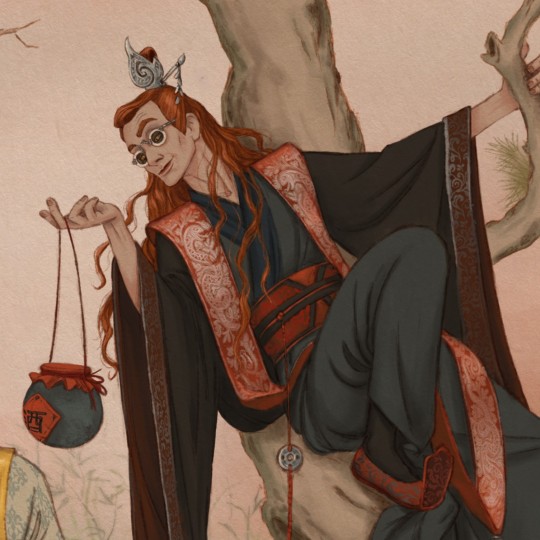

I'm kinda late to the party, but life is cray! So here's my latest contribution to the Good Omens universe agsfaagds.
I really wanted to see our demon and angel in more alternate historical settings and chose the Tang Dynasty, with some help from my friend. I wasn't going for something entirely historical looking, but inspired. So I studied the style of a bunch of drawings and paintings of the era, as well a whole lot of traditional clothing.
And DON'T even get me started on those hanzi. To any Chinese reading this, I'm sorry, I did the best I could XD And hey, if anyone would like to offer to rewrite the poem PROPERLY, that would be amaziiiiing! (It hopefully says "To the world" and that red thing would be the artist seal with my name.)
#good omens#ineffable husbands#crowley#aziraphale#china#suthnmeh#david tennant#michael sheen#neil gaiman#terry pratchett#tang dynasty#grandmaster of demonic cultivation#is this danmei
452 notes
·
View notes
Text



These past few days, I've felt so motivated. Everything has been going very well. Also, in two weeks, I'll finally be able to rest a little. I can't wait for it!
3 notes
·
View notes
Text
DAILY CHECK-IN: Thu , 9 January 🫧🎀



Today's Priorities: Let's get it done ~
Learn Chinese for 10 mins
complete at least 30% more progress on the project model
Practice writing 20 times hanzi characters
Study remaining 2 experiment theory
Revise 5 experiment theories , review process
Practice sign language for 10 mins
Clean make up brush & blender
Late evening exercise
Shoot 1 or 2 scenes for yt & edit
Take a refreshing shower
Take my Snoo on a walk around 5 something
Today's Wins ~
Completed learning chinese for 10 mins
Completed 40 % of the project model
Finished studying theory of the remaining 2 experiment
Done revising 4 experiment theories, reviewed 2 process
Took a refreshing shower
Took my Snoo for walk around 5 something
Swept every room flawlessly while listening to my favourite playlist
Missed Priorities/Partial completion
Sign language
20 times hanzi characters
Clean make up brush+blender
Late evening exercise
#it girl#becoming the best version of yourself#becoming that girl#mindfulness#self care routine#daily routine#wonyoungism#wonyoung moodboard#self care#studyblr#langblr#lifeblr#blog#this is a girlblog#self improvement#uniblr#university student#that girl
23 notes
·
View notes
Text
Whenever I see danmei discourse reliant on translations, especially where translator interpretations differ, it's so clear that a lot of English-speaking danmei fans truly believe, consciously or unconsciously, that translation is a plug-and-play, one-for-one prospect - that languages are interchangeable and there is an Exact One True Translation that the Perfect Translator will be able to unearth and provide to the masses that ideally encapsulates the original using accurate words.
I suspect this is a venn diagram in the shape of a circle with people who are English monolingual.
I also suspect this is a venn diagram in the shape of a circle with people who think their own interpretation of a text is Truth instead of one possible reading.
Like, even when we read a book in the language it was originally in, there isn't only one true meaning - different people will interpret it differently.
That is magnified when we can only access the text via translation - translation can never be a perfect art because languages aren't one-for-one and English doesn't have words or phrases for every concept in every other language (no two languages do!) and translators have to take what's in the original, interpret it as best they can through their own lens, then convert that into another language while trying to preserve the meaning, the intent, the nuance, the lyricism, and give the secondary language reader something readable, polished, and eloquent.
It cannot be done perfectly.
Having access to multiple translations that differ is a strength, not a weakness - a window into the nuance that is lost in any one translation, a glimpse at how complex and beautiful the original language is.
But there will never be One True Translation, anymore than there will ever be One True Interpretation. That's. That's not how books work.
I am begging English-speaking danmei fans to wrap theirs heads around this, and maybe attempt to study even a little Chinese before opening their mouths about the translation aspect of these books.
If I never see another "I plugged the hanzi of this characters name into a machine translator and they literally mean this hahaha" post again it'll be too soon. If I never see another "this version of the translation is Wrong I will use the version that narrowly supports my personal interpretation" post again it will be too soon. Like. Uggggh.
(This wasn't prompted by anything I saw recently/today it's just a constant low-level annoyance.)
#unforth rambles#and this is why ive been studying chinese for three years#i just want to get to the source and be able to interpret it for myself#but the vast majority of people in english fandom seem to have zero interest in learning chinese#its baffling to me tbh#to see the same people quibbling over translation have zero understanding of how translation works#and zero interest in learning the language so they dont have to rely on translation
41 notes
·
View notes